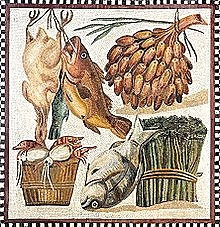ShelfControl

Still life on a 2nd-century mosaic, with fish, poultry, dates and vegetables from the Vatican museum
"A decent pot of beans will last through a week of breakfasts and lunches if you're not too picky."
©2020 by David A. Schmaltz - all rights reserved
Three months ago, when the stay-at-home directives hit, you could be excused if you thought that few people had ever put much thought into the idea of maintaining a pantry. City dwellers have always struggled with shortages of shelf space counterbalanced with a choice of corner bodegas and convenient restaurants. Country dwellers have always maintained some cellar space for what they euphemistically referred to as canned goods, and many maintained more than one refrigerator and even a supplemental freezer or two or three to sustain a sense of self-sufficiency. When it's ten or more miles to the nearest store, an inconvenience market primarily selling gasoline, one quite naturally stockpiles and makes do. The professional class tended to eat out more frequently, daily lunches and a couple of suppers out each week, while the working class might have more frequently brought their own bag lunch and made their own suppers at home, often after a quick stop for that evening's ingredients on the way back.
But the stay-at-home directives disrupted these rhythms, forcing folks to suddenly attend to more than than just the meal before them. Stocking up became both an imperative and, increasingly, a logistical impossibility, as supplies ran short and many chose to actually shelter in place. Beans became a revered addition and the much-maligned casserole came back into fashion. Fresh became increasingly scarce, supplanted by the humble canned alternative many of us had shunned since we ran away from home as teenagers. Our suppers started more closely resembling our forebears' and our recycling bins filled to overflowing with strange bottles, bags, and flattened cans. Our larders, such as they were, grew in disorderly fashion, with each shopping foray's discoveries haphazardly stuffed onto once precisely organized shelves. I went through a period where I concocted two or three big batches of stock each week, each batch yielding six or seven full quarts which, once pressure canned, needed scarce shelf space. Pasta started spreading into multiple places separate from it's usual insignificant foot of shelf front in the basement, and likely to pop up mixed in with the fresh potatoes or bread.
Through the resulting months, I've every day resolved to better organize our stores. Each evening, I fall asleep recognizing that another disorganized day has passed without me intervening to resolve the crush. Each now rare excursion to the store brings back more material likely to remain into time immemorial. I have no idea where or when much of it might conveniently fit into an upcoming menu, and I feel almost beyond caring. I'm accepting that this once well-regulated part of my life has now, and probably permanently, gone to seed, largely weeds where I once proudly and self-importantly displayed the products of past produce processing: The Muse's several varieties of jam, my tiny jars of canned green chile, once enough home-canned mason jars of tomatoes to float several battleships, tart cherries, frozen berries. Tomatoes, impossibly, all used up, the balance, if we could find it, in considerable disarray.
I've long insisted that my larder was the one true mirror of my soul, disclosing both palate and intention. Now, it looks as if it needs a haircut every bit as badly as does its lowly tender. I continue, each day, imagining myself pruning and properly displaying our secret largess and each evening coming to recognize that I have not even tried very hard to accomplish that end. Again. This pandemic time dissuades such organizing, if only because any organization demands some understanding of future use. My vision for both my immediate and longer-term future remain fogged, fuzzy, and unresolved. With stay-at-home orders lifting, The Muse, The Otter, and I remain sequestered, concerned with the hasty-seeming cessation. The bunker seems more homey now, after a lengthy period of it feeling more like a prison cell, and we feel well-enough provisioned, even if we can't always find what we're convinced that larder holds. We control our selves if not our shelves. Confidently uncertain what comes next, we more frequently reheat yesterday's leftover solution to the supper problem and call that good. A decent pot of beans will last through a week of breakfasts and lunches if you're not too picky.


